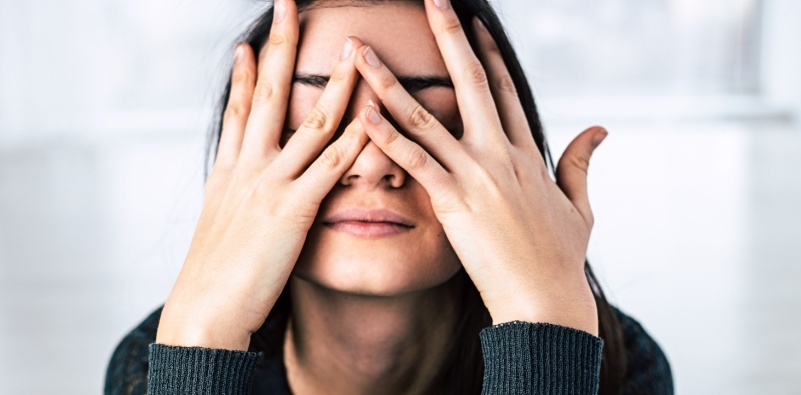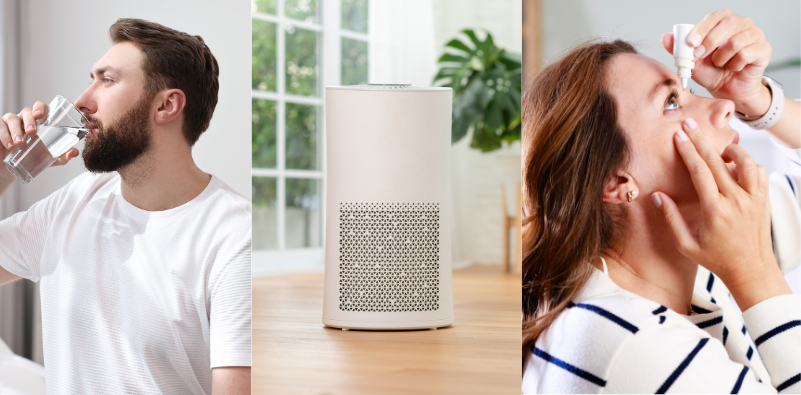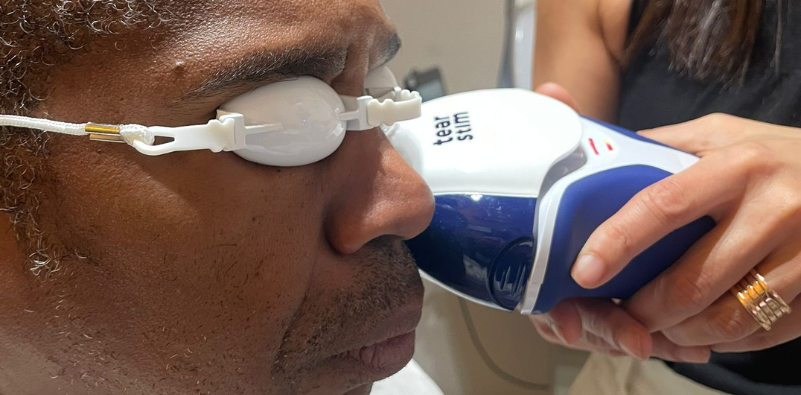Dry eyes and stress: what’s the connection?
According to the Mental Health Foundation, 74% of UK adults have felt overwhelmed with stress at some point in the past year. April marks Stress Awareness Month, making it the ideal time to explore how stress can impact various aspects of health, including your eyes.
While the link between stress and mental wellbeing is clear, few people realise its significant connection with dry eyes. The relationship works both ways: stress can trigger or worsen dry eye symptoms, and dealing with eye discomfort can increase your stress levels.
Let’s unpack the science behind this little-known connection and share practical tips for managing both.
The science: how stress can affect your eyes
When we feel on edge, our bodies release cortisol. Often called the “stress hormone”, cortisol prepares our bodies for action by raising energy levels and blood sugar. While this is important, elevated levels over time can negatively impact several bodily systems, including your eyes.
Here’s how it can affect your eyes:
Disrupted tear production: Your tears consist of a delicate balance of water, oils, and mucus. Stress can interfere with the tear glands that produce the watery component of tears, and the meibomian glands that create the essential oily layer that prevents them from evaporating too quickly.
Different behaviours: When we’re feeling anxious or under pressure, we often adopt behaviours that can impact eye health, including making dry eye symptoms worse. These include:
- reduced blinking, especially when concentrating intensely
- increased screen time, which makes you blink less frequently
- difficulty sleeping, which affects tear production and eye moisture levels
- forgetting to drink enough water and becoming dehydrated
Compromised immune system: Regular states of angst can weaken the immune system, which makes your eyes more vulnerable to inflammation. This can contribute to eye discomfort and reduce tear quality.
Feeling physically tense: Ever noticed yourself frowning when you’re stressed? Feeling anxious can cause unconscious tension in facial muscles, including those around the eyes. This can restrict blood flow and contribute to eye discomfort.
How dry eyes increase stress
Stress can contribute to dry eyes, and the reverse is also true. Dry eye can raise anxiety levels, potentially creating a vicious cycle.
Dry and itchy eyes are two of the most common dry eye symptoms. Sensations include irritation, burning, stinging, and grittiness, which can be distracting and uncomfortable, making you more distressed.
This means focusing on tasks, particularly those involving reading or screen time, can be difficult. You might find yourself falling behind at work or in other areas of life.
Eye discomfort can also disrupt sleep patterns. Poor sleep is known to increase stress and can create a cycle.
Finally, it’s natural that sight problems can cause anxiety about eye health, particularly for those who rely heavily on good vision for work or have a family history of eye issues.
Practical tips for managing dry eye and stress
Breaking the cycle requires strategies that target both dry eye and feelings of distress. Here are some effective approaches.
- Stay well-hydrated: Drinking plenty of water supports overall hydration, including tear production. Aim for at least 6-8 glasses of water daily, more if you exercise.
- Use quality eye drops: Artificial tears can provide immediate relief from dry eye. Ask our opticians for advise based on your individual needs.
- Take breaks from digital devices: When using digital devices, aim to take a screen break every 20 minutes. Try looking at something in the distance to switch between near and far focus. This simple habit helps your eyes and encourages natural blinking.
- Go easy on the air conditioning: Air conditioning decreases moisture in the air. If possible, open a window or pull the blinds to cool a room off rather than run the air conditioning. Consider using a humidifier if your environment has particularly dry air.
- Keep your environment clean: When you’re busy, neglecting household chores is easy. But dust and dirt in the air can exacerbate dry eyes. Get that duster out and, if you’re in a particularly dusty environment such as a workshop, consider wearing eye protection.
- As an added bonus, a spring clean will do wonders for your mental wellbeing.
Reducing stress and promoting overall health
- Practice mindful breathing: Even just 5 minutes of deep, controlled breathing can reduce cortisol levels. Try inhaling for a count of four, holding for four, and exhaling for six.
- Take regular movement breaks: Physical activity helps reduce stress hormones and increases endorphins. Take a short walk or practice gentle stretching for five minutes – it all makes a difference.
- Plan your sleep routine: Maximise your chances of restful sleep by creating a sleep-friendly routine. Avoid screens before bedtime, keep your bedroom cool and dark, and stick to consistent sleep and wake times.
- Follow a balanced diet: We are what we eat. Omega-3 fatty acids (found in oily fish, flaxseeds, and walnuts) will help improve your tear film quality. A diet rich in colourful fruits and vegetables will give you plenty of antioxidants that combat inflammation.
The connection between dry eyes and stress is clear, but understanding this relationship empowers you to break the cycle. This Stress Awareness Month, take the simple steps outlined, and you’ll make a significant difference to your eye health and mental well-being.
When to seek professional help
While self-care strategies are effective for many people, persistent dry eye symptoms or chronic stress may require professional support.
At Optikal Opticians, we can evaluate your tear quality and quantity, identify underlying causes, recommend state of the art treatments to alleviate your dry eyes significantly, and review your overall eye health.
If you’re experiencing ongoing eye discomfort, particularly if it worsens during stressful periods, book an appointment with our opticians in Potters Bar, Finchley and Temple Fortune today.





